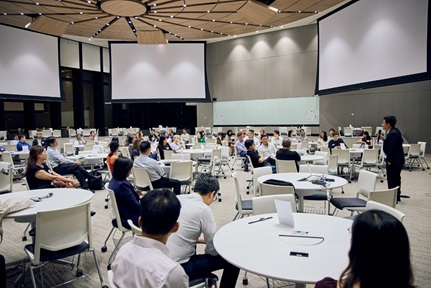Covid and border curbs hit enrolments at private schools
Foreign student enrolment in Singapore has plunged over the past year and a half, official statistics obtained by The Business Times (BT) show.
On the flip side, the number of Singaporeans applying to study overseas also dived.
The number of international students fell to about 59,000 as at end-August 2021, down by 13.5 per cent from 68,200 as at end-April 2020, according to figures from the Ministry of Education (MOE) and the Immigration and Checkpoints Authority (ICA).
The share of student pass holders in private education institutions (PEIs) fell from 35 per cent to 25 per cent, though the authorities did not provide BT with historical data to compare with pre-pandemic levels.
Without giving an exact headcount, a spokesperson for the not-for-profit Management Development Institute of Singapore (MDIS) said travel curbs and border closures in the past year "affected the international students' enrolment by at least 20 per cent as they were unable to enter Singapore".
Foreign students made up 40 per cent of pre-pandemic enrolment, but now "we see an unprecedented decline", said the spokesperson, citing a drop in students arriving from places such as India, Malaysia and Vietnam.
The fall in the number of foreign students could have had a "very significant" impact on PEIs in Singapore, said Nanyang Technological University's Associate Professor Damien Joseph, undergraduate academic associate dean at the Nanyang Business School, who pointed to both the financial impact on private schools' main income source, as well as the Singapore education sector's ability to maintain its status as a regional hub.
Tristan Hockley, education sector leader at PwC, remarked to BT: "Some PEIs have tried to attract more international students from markets where travel into Singapore has been less restricted - for example, China - to make up for this shortfall."
Indeed, a representative of Australia's James Cook University (JCU) said "consistent demand from the Chinese market" helped sustain enrolment at its Singapore campus, where about 70 per cent of the roughly 3,500 students are foreigners.
"We are still on target to achieve the projected growth in our student intake, mostly driven by the demand in China, Indonesia and Singapore," said JCU international dean May Tan-Mullins, whose team has projected a 20 per cent year-on-year increase in new students in 2021. "While there are some challenges in some of the South-east Asian countries, we are confident that things will get better."
Similarly, the MDIS spokesperson indicated that enrolment from Myanmar and Commonwealth of Independent States partially offset the reduced overseas recruitment elsewhere.
But the fast-moving Covid-19 situation may make it tough to depend on specific markets for student growth.
Furen International School, which prepares candidates for exams such as the O and A levels, saw interest from China plunge in September when infections spiked in Singapore, said director David Mok: "This increase in new cases prompted a large number of student withdrawals."
Citing a jump in no-shows in the third quarter, he now expects "a continuous decline in student arrival" all the way until mid-2022, since China makes up the school's main market.
The number of student pass holders varies seasonally - shrinking in May, June and December, when cohorts graduate, and picking up in January and August as terms begin.
But the MOE and ICA also jointly told BT: "The evolving pandemic situation and travel restrictions imposed across countries since March 2020 would also have affected the plans of international students coming to Singapore to pursue their studies."
One possibility is for PEIs to plug the enrolment gap with local students - especially as the pandemic also stymies their plans to study abroad.
Said EY Asia-Pacific private equity leader Luke Pais: "The key challenge now is student recruitment, as the revision of criteria for work passes makes it more challenging to attract (foreign) students as employment outcomes are affected. PEIs can employ revenue diversification strategies, by offering career-related lifelong learning programmes targeted at experienced working professionals."
Indeed, overseas education consultancy IDP recently reported sharp declines in Singaporeans' interest in studying in major destinations.
IDP saw applications to Australian universities fall by 43.8 per cent from FY2019, to 717 in FY2021, while applications to British schools dropped by 23.7 per cent to 219 in that period. IDP's financial year runs to end-June.
Amid lower foreign enrolment, the MDIS spokesperson noted that the school has focused on diversifying offerings in hot areas such as nursing, information technology, and cybersecurity: "With the shift in the market demand, we are seeing more local students, including professionals, managers, executives and technicians working in the relevant sectors."
But EY's Pais noted that Singaporeans who plan to study abroad typically aim for universities with top-quartile rankings and may be "different from the target students of PEIs".
PwC's Hockley also believes "it will be difficult for local students to make up the gap from international students", and highlighted "increased competition for local students" at both private and public institutions.
As such, "we are seeing significant investment by PEIs to refresh their business strategy, transform their operating model and provide stronger differentiation or branding in the market", he said. "While government funding has mitigated economic impacts, the key focus will be on ensuring business sustainability post Covid-19."
Meanwhile, Prof Joseph suggested that PEIs can also make up the shortfall through tie-ups with universities located in traditional destination markets for Singaporean students.
"Some PEIs have ventured overseas and have a presence in those regional countries," he added, calling these schools far-sighted. Smaller PEIs "may be suffering from reduced attractiveness and enrolment", especially if programmes involve travel with overseas partners, but "the major PEIs are on good foundation".
Source: The Business Times





.tmb-listing.png?Culture=en&sfvrsn=64dc3641_1)
